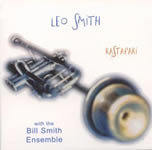|
|
 |
Dusted Reviews
Artist: Leo Smith with the Bill Smith Ensemble Album: Rastafari Label: Boxholder Review date: Oct. 20, 2003 |

|
|
|
 |
The original cover of the 1983 Sackville Records LP features a picture of the artist looking enigmatically at the camera like a Kingston rude boy on the cover of a reggae import. The chant at the beginning of the album, however, makes it clear that there will be no reminiscing about government mansions down in Trenchtown; no punky reggae free jazz party here. Instead, Smith assumes the voice of a wise and aging spiritual leader, preaching to the faithful. Without warning, the rest of the ensemble bursts in with a flourish of barely tonal string thrusts. They quickly take hold of the chant, spinning it off into unexpected territory.
The four member Bill Smith Ensemble give “Rastafari” (the only Leo Smith composition on the album) a rich and nuanced treatment. Vibist Larry Potter and altoist Bill Smith team up, adding bursts of wild blowing and spiky accents to the mix; meanwhile, violinist David Prentice and bassist/cellist David Lee expose the composer’s frigidly dissonant harmonies with a certain skewed lyricism. Where the horns suggest a debt to ’60s Brit improv, the strings often seem to recall Schoenberg’s “Verklarte Nacht”. After a brief rambling excursion from Potter and flourishes of activity from the strings, not to mention the occasional blast of harmon-muted exuberance from the leader, the tension that has been building throughout the piece appears to slacken. Even though the dialogue between the players has reached a conclusion, Smith gives us neither a harmonic resolution nor a recapitulation of the initial chant. Instead, the ending seems to mark how far the language of the piece has developed from its initial source.
The other compositions here, two from Bill Smith and one from David Prentice, are presented as though they were further developments of “Rastafari” itself. Smith’s “Rituals” draws from Ligeti’s blurry tonal excursions, with warped string drones that don’t stand still long enough to get your head around. The result is unsettling, and at over 12-minutes in length, difficult to endure more than once or twice (though well worth it). Prentice’s “Madder Lake” goes even further in this direction, moving so slowly at times that it threatens to break into full-on mid-’60s minimalism. Then Leo Smith lets off some blustery salvos as if he had joined an imaginary up-tempo session, and Bill Smith’s sopranino sax begins darting around like a demented moth. The whole piece picks up steam, but as in the entire album, there is a shocking lack of joy in the proceedings – it is as though they simply played the same music, only faster. Even Bill Smith’s pleasantly-titled and appropriately disjointed “Little Bits” carries a sense of foreboding, of lingering tension that has no release. In short, as smart as these four players are, it certainly doesn’t sound like they’re having much fun.
To call Rastafaria serious album would be an understatement of colossal proportions. You can feel the weight of the players’ ideas in the consideration given to every note, in every well-judged silence. In some ways, it feels like a direct descendant of modernism; progressive, but with one eye trained on the past – shamelessly intellectual, and above all, difficult. What it fails to share with Pound and Eliot, and Schoenberg, Ligeti, Dolphy (and even Braxton, on a good day), is a sense of pleasure, vitality, the simple visceral thrill of making a big noise. Even though there is ample room in contemporary music for compositions like these, you can’t help but wonder what would have happened if Smith had borrowed a hint of the punky reggae free jazz party that the album cover seemed to suggest.
By Dave Morris
|







